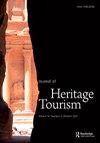Let’s listen: the voices of ethnic villagers in identifying host-tourist interaction issues in the Central Highlands, Vietnam
IF 2.2
Q2 HOSPITALITY, LEISURE, SPORT & TOURISM
引用次数: 0
Abstract
Host-tourist interaction is a core attraction of ethnic tourism. Yet both parties may confront challenges in such interactions because of different cultural backgrounds. This study aims to investigate host-tourist interaction issues in Vietnam’s Central Highlands by adopting a qualitative approach wherein 31 semi-structured interviews were conducted with villagers. Results find that villagers interacted with domestic tourists mostly in private houses, tourist attractions and facilities, and on tours. In such settings, the content of interactions varied from low to high intensity. Derived from the Coordinated Management of Meaning (CMM) theory [Pearce, W. B., & Cronen, V. E. (1980). Communication action and meaning. Praeger], verbal (language) and non-verbal behaviour and cultural patterns were the greatest interaction difficulties. While interaction difficulties occurred across different settings, higher intensity interactions resulted in more positive outcomes. This study enriches the existing knowledge on interaction between ethnic hosts and domestic tourists in the intra-national context. The interpretive theoretical and methodological utility of CMM provided insight into interaction difficulties, and opportunities to facilitate positive interactions in ethnic tourism development. Further implications for villagers, tourists, local policymakers, and tour operators were suggested to build long-term sustainability of the host-tourist relationship in the Central Highlands.让我们来听一听:越南中部高地少数民族村民对主客互动问题的看法
主客互动是民族旅游的核心吸引力。然而,由于文化背景的不同,双方在这种互动中都可能面临挑战。本研究旨在通过采用定性方法调查越南中部高地的主人-游客互动问题,其中与村民进行了31次半结构化访谈。结果发现,村民与国内游客的互动主要集中在私人住宅、旅游景点和设施以及旅游中。在这种情况下,相互作用的内容从低强度到高强度不等。源自意义协调管理(CMM)理论[Pearce, W. B., & Cronen, V. E.(1980)]。沟通的行动和意义。,语言(语言)和非语言行为以及文化模式是最大的互动困难。虽然互动困难发生在不同的环境中,但高强度的互动会产生更积极的结果。本研究丰富了国内背景下民族东道主与国内游客互动的现有知识。CMM的解释性理论和方法论效用提供了对互动困难的洞察,以及促进民族旅游发展中积极互动的机会。对村民、游客、当地政策制定者和旅游经营者的进一步建议是在中部高地建立长期可持续的东道主-游客关系。
本文章由计算机程序翻译,如有差异,请以英文原文为准。
求助全文
约1分钟内获得全文
求助全文
来源期刊

Journal of Heritage Tourism
HOSPITALITY, LEISURE, SPORT & TOURISM-
CiteScore
6.50
自引率
11.10%
发文量
39
期刊介绍:
The Journal of Heritage Tourism ( JHT ) is a peer-reviewed, international transdisciplinary journal. JHT focuses on exploring the many facets of one of the most notable and widespread types of tourism. Heritage tourism is among the very oldest forms of travel. Activities such as visits to sites of historical importance, including built environments and urban areas, rural and agricultural landscapes, natural regions, locations where historic events occurred and places where interesting and significant living cultures dominate are all forms of heritage tourism. As such, this form of tourism dominates the industry in many parts of the world and involves millions of people. During the past 20 years, the study of tourism has become highly fragmented and specialised into various theme areas, or concentrations. Within this context, heritage tourism is one of the most commonly investigated forms of tourism, and hundreds of scholars and industry workers are involved in researching its dynamics and concepts. This academic attention has resulted in the publication of hundreds of refereed articles in various scholarly media, yet, until now there has been no journal devoted specifically to heritage tourism; Journal of Heritage Tourism was launched to fill this gap. JHT seeks to critically examine all aspects of heritage tourism. Some of the topics to be explored within the context of heritage tourism will include colonial heritage, commodification, interpretation, urban renewal, religious tourism, genealogy, patriotism, nostalgia, folklore, power, funding, contested heritage, historic sites, identity, industrial heritage, marketing, conservation, ethnicity, education and indigenous heritage.
 求助内容:
求助内容: 应助结果提醒方式:
应助结果提醒方式:


